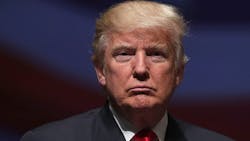The White House backed away from an administration letter to key members of Congress suggesting that President Donald Trump is softening his protectionist stance on NAFTA and instead seeking modest changes to the trade accord.
The draft renegotiation plans circulated in a letter from acting U.S. Trade Representative Stephen Vaughn would leave in place controversial pieces of the trade pact with Canada and Mexico, including an arbitration panel that lets investors bypass the court system to redress claims under the pact. Trump called NAFTA “a disaster” during his campaign.
White House Press Secretary Sean Spicer said Thursday at his daily briefing that the draft, first reported by the Wall Street Journal and obtained by Bloomberg News, doesn’t reflect Trump’s goals for the talks.
“That is not a statement of administration policy,” Spicer told reporters. “That is not an accurate statement of where we are at this time.”
Spicer added that Trump’s nominee for U.S. trade representative, Robert Lighthizer, hasn’t yet been confirmed by the Senate.
The letter listing U.S. objectives for renegotiating the North American Free Trade Agreement also doesn’t include goals some critics of the deal have sought, such as a way of addressing disputes over currency policies or setting targets for reducing the trade deficit.
Still, Vaughn said in the letter that the U.S. will seek authority to reimpose tariffs to protect industries at risk of serious injury from trade with Canada or Mexico.
Persistent Deficit
“The persistent U.S. deficit in goods trade with Canada and Mexico demands that this administration take swift action to revise the relationship and respond to 21st century challenges,” Vaughn wrote in a March 22 draft letter shared with key members of Congress and obtained by Bloomberg News. “Most chapters are clearly outdated and do not reflect the most recent standards in U.S. trade agreements.”
The letter also calls for leveling the playing field in tax treatment, expanding opportunities for agriculture and strengthening rules of origin that favor the U.S. economy. It also mentions public procurement as Trump promotes his “Buy American” policy for infrastructure.
Trump is preparing to trigger a renegotiation of NAFTA. The president must consult with Congress before issuing a formal 90-day notice of his intent to revisit the deal, but the administration so far has been vague about what the U.S. will seek from Mexico and Canada in the talks.
Mexico announced on Feb. 1 the start of its own consultations on NAFTA, which created one of the world’s largest free-trade zones. The Mexican government will hold talks with businesses and other stakeholders, its government said.
The approaching negotiations come at a tense time between the U.S. and Mexico, whose president, Enrique Pena Nieto, canceled a visit to Washington in January after Trump doubled down on promises to make the country pay for a border wall.
Any of the three countries can withdraw from NAFTA on six-months’ notice. Trump has said he would pull out if his counterparts aren’t willing to renegotiate it.
About the Author
Bloomberg
Licensed content from Bloomberg, copyright 2016.
